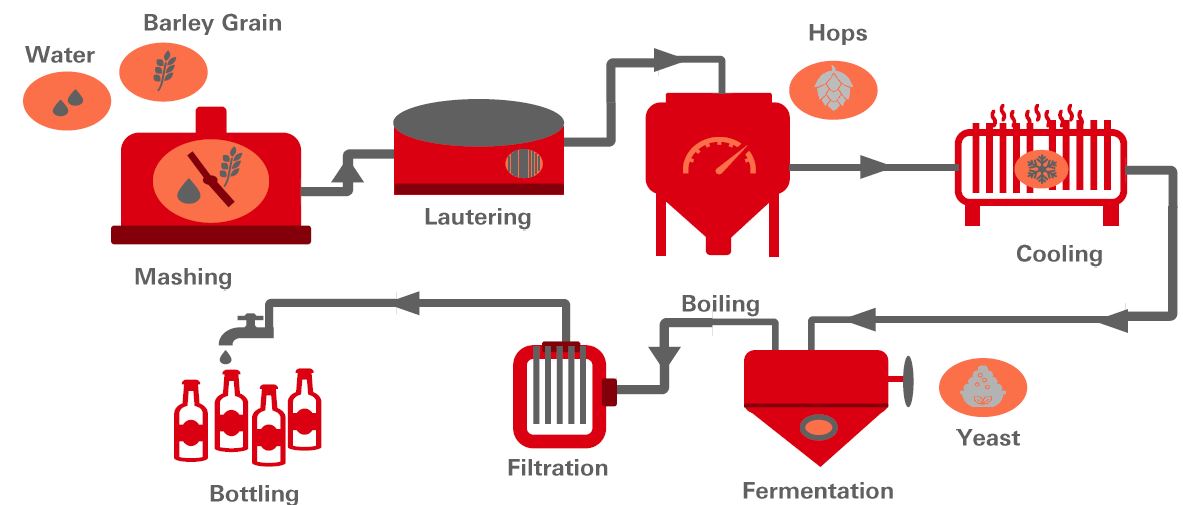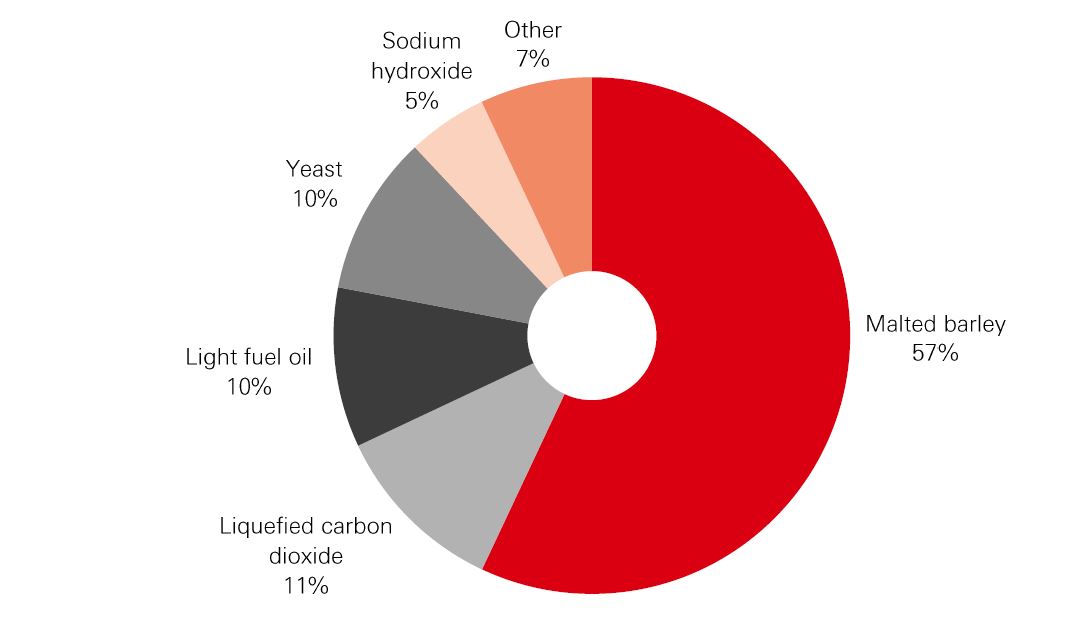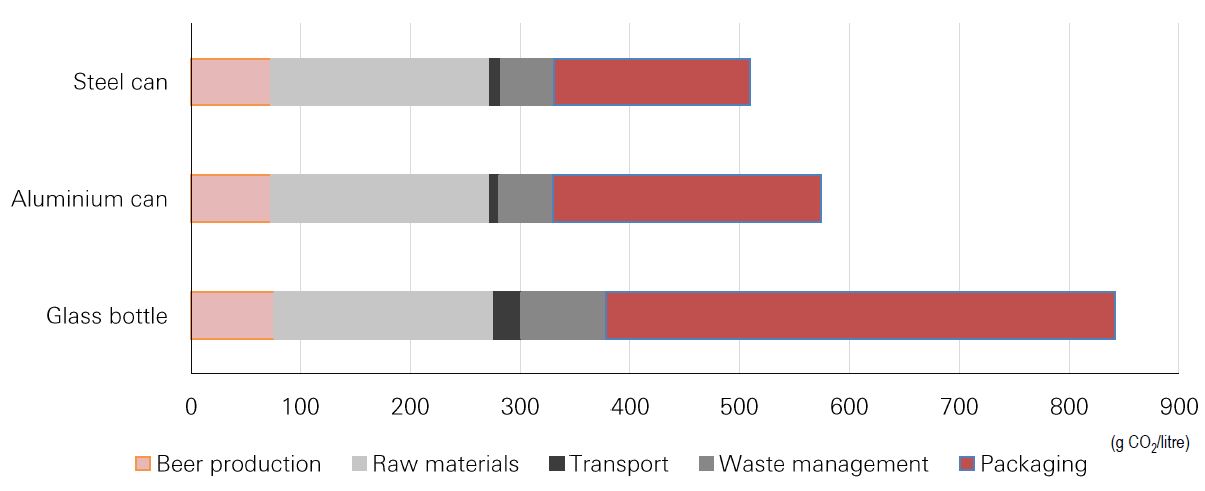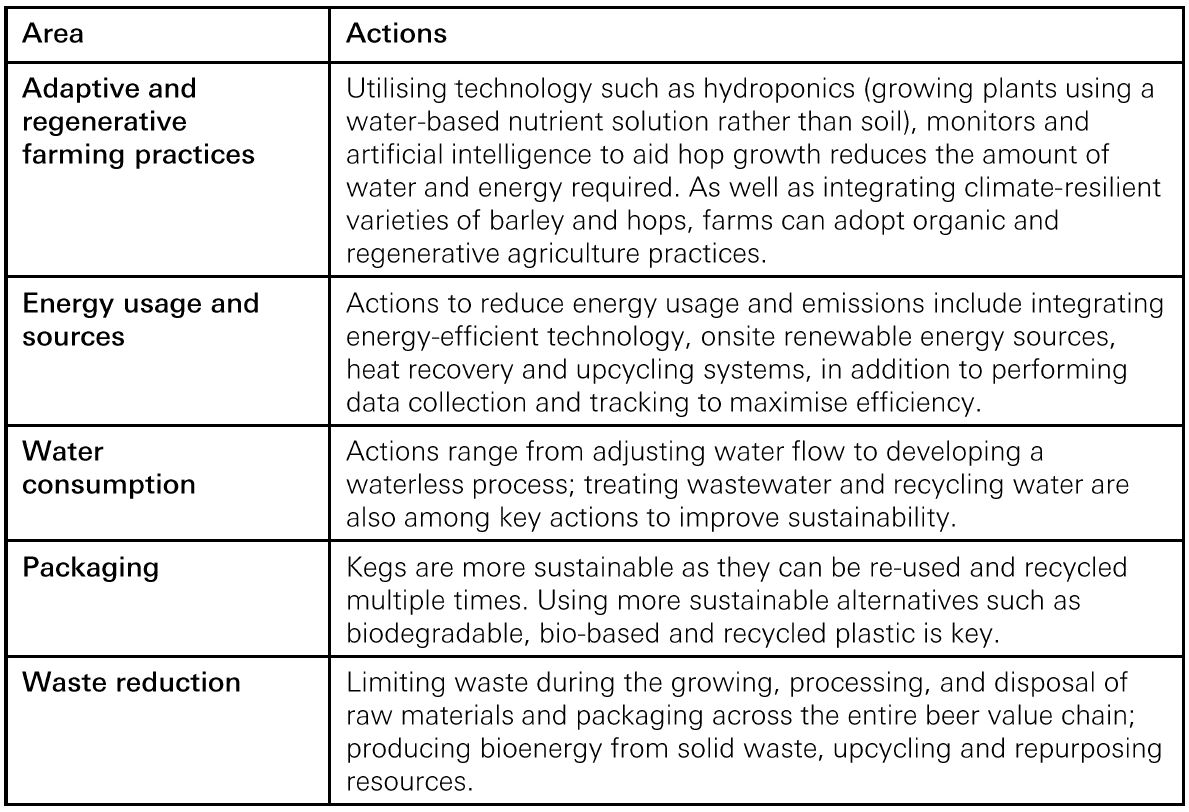
21 August 2024
Climate change affects the taste of beer, and firms in the industry need to ensure taste quality is maintained as demand rises. Brewers are also under pressure to be more sustainable in terms of water use, raw materials and packaging emissions. We think investor scrutiny of retailer commitments could help ensure beer is more sustainably enjoyable.
In this issue of #WhyESGMatters, we discuss the climate and environmental issues associated with beer production and what brewers and investors can do to alleviate this impact.
Did you know? Alpha acids are chemical compounds found in the hop plant, which are the source of bitterness, aroma and flavour in beer. Bitter hops have a higher alpha acid content and are generally used to extract bitterness. Aroma or finishing hops have a lower alpha acid percentage, but they contribute to the overall flavour profile. Changes in alpha acids affect the quality of aroma hops, which has an impact on beer’s flavour.
Source: M Mozny et al., Climate-induced decline in the quality and quantity of European hops calls for immediate adaptation measures, Nature Communication, 10 October 2023; European Commission, Crop productions and plant-based products: hops and Hop report for the harvest year 2022; D Amienyo, A Azapagic, Life cycle environmental impacts and costs of beer production and consumption in the UK, The International Journal of Life Cycle Assessment, 2016, World Spirit Alliance, Spirits: Global Economic Impact study 2024.
Beer is one of the most popular drinks globally, accounting for 75% of total beverage alcohol volumes, compared to 10.4% for wine, and 9.9% for spirits. The beer industry sits just below spirits in terms of consumer spend, representing 40% of the alcoholic beverage market value.[@why-esg-matters-04-01] China, the US, and Brazil lead beer market share, accounting for 21.9%, 10.6%, and 7.8% of sales, respectively as of 2022, but Czechs consume the most beer per capita, over 6x China and 3x US, at 189 litres per year.[@why-esg-matters-04-02]
Hops: The growing consumer preference for beer flavours, which depends on high-quality hops[@why-esg-matters-04-03], has led to increased focus on the impact of climate change on beer brewing. A recent study by the Czech Academy of Sciences and Cambridge University[@why-esg-matters-04-04] compared European aroma hops during two periods, 1971–1994 and 1995-2018, and found that rising temperatures associated with climate change delayed the start of the hop-growing season by 13 days from 1970 to 2018. This pushed back the critical ripening period towards the warmer part of the season, lowering the alpha acid content in hops and impacting the aroma and flavour of beer.
Climate change is likely to continue to impact European and other top hop-growing regions globally, such as the US (Idaho, Oregon, and Washington), China (Xinjiang and Gansu) and Australia (Tasmania and Victoria).[@why-esg-matters-04-05] For example a decline of 20-31% in alpha acid content is anticipated in Europe by 2050, while overall yields are expected to shrink by 4-18%.[@why-esg-matters-04-06] Given that all G20 countries have seen rising temperatures, we expect hop cultivation in these other markets to face similar challenges.
Beer production process

Note: some techniques may vary, e.g., hops may be added at various stages of the process, such as mash hopping and dry hoping.
Source: HSBC, Britannica.
Malted barley: Climate change is also likely to affect malted barley crops, with big implications for the beer industry, given malt provides sugars responsible for alcohol concentration and proteins required for beer’s foaming properties. Indeed, one study shows that most of today’s barley harvesting areas will get warmer and dryer, resulting in sharp declines in yields, by 3-17%, depending on the environment.[@why-esg-matters-04-07] Research also suggests that increased temperatures and heat intensity can lead to significant rises in grain protein concentration, which reduces the starch concentration and enzymes necessary for high-quality malt and good beer production.[@why-esg-matters-04-08]
We think investors should consider how hop and barley farmers, as well as firms in the sector, implement adaptation measures to ensure availability of high-quality crops. For example, some hop farmers are relocating their gardens to higher elevations and valley locations with higher water tables. They’re also building irrigation systems or protective shading structures and breeding more drought resistant varieties.[@why-esg-matters-04-09]
Some commentators suggest that, ultimately, hop growing is likely to move to cooler locations, even such as Finland or Norway, due to cost considerations; this adaptation measure is proving to be effective in wine industry. For barley, similar adaptation measures can be done; researchers are also working on new strains of barley that can be grown in different conditions while maintaining malt brewing quality, such as ‘winter ready’ varietals.
Throughout the lifecycle of beer, sustainability issues exist in the cultivation of raw materials, the production of beer by breweries, and in the packaging and delivering of beers to stores or other places. We discuss three key environmental impacts of beer below.
Water is an essential component in farming beer’s key ingredients, barley and hops. According to the Water Footprint Network, malted barley required to produce one litre of beer needs nearly 300 litres of water. Water is also key in beer’s production processes, from the mashing of grains to washing and cleaning equipment after each batch is completed. The brewing stage itself consumes, on average, between 4-7 litres of water per litre of beer in smaller craft breweries.[@why-esg-matters-04-10] In the UK alone, the production of beer requires 185bn litres annually, c5% of the UK’s total water demand.[@why-esg-matters-04-11]
Malted barley encompasses a highly energy-intensive production process, so it’s unsurprising that among the raw materials used to make beer, it makes the biggest contribution to emissions. The use of pesticides and fertilisers not only releases further emissions but also raises biodiversity risks. Globally, 64% of agricultural land is at risk of pesticide pollution, and 34% of high-risk areas are high-biodiversity regions.[@why-esg-matters-04-12] Hops face similar challenges on top of the energy required to dry them before the boiling process.
Contribution of different materials to beer’s overall emissions from raw materials

Note: Hops are included in ‘Other’
Source: The International Journal of Life Cycle Assessment (2016)
Emissions from packaging contribute the largest part of the beer industry’s carbon footprint, which is largely driven by the production and transportation of glass bottles. It’s estimated that one litre of beer packaged in glass requires 55% more primary energy, compared to the same volume in aluminium cans. Recycling and reducing the weight of glass packaging is key: a 10% weight reduction is estimated to save 5% of emissions.[@why-esg-matters-04-13] At the same time, kegs are the most sustainable option as they can have a useful life of more than 30 years and can be reused more than 150 times before being recycled.[@why-esg-matters-04-14]
Emissions intensity of beer by packaging and life cycle stage

Source: The International Journal of Life Cycle Assessment.
Recent years have seen the rise of carbon-neutral and net-zero breweries. Carbon neutral breweries emphasise the use of carbon offsets, conversely, net-zero breweries take a more proactive approach by addressing emissions across production and supply chains, integrating renewable energy sources and efficient technologies.
With the rise of health-conscious consumers, a rising number of consumers chooses non-alcoholic beverages. According to a 2023 UK survey, 44% of individuals aged 18-24 consider themselves either occasional or regular drinkers of non-alcohol alternatives, and 33% consider themselves non-drinkers.[@why-esg-matters-04-15] The industry is catching the drift: popular beer brands have started producing low and non-alcohol beers. Non-alcoholic beers require less processing and resources than alcoholic beers and are therefore more sustainable. But the environmental impact of barley and hops, which are still key to their flavour, remains significant.
We think beer lovers should be aware that these flavoured or hop-forward beers come with a higher environmental impact; they require more aroma hops and are often more water and space intensive than other hop varietals. For example, in the US, it takes c70% more land and water to produce one kilogram of aroma hop pellets than for alpha hop pellets.[@why-esg-matters-04-16]
Actions towards sustainable beer production

Source: HSBC; Responsible Brewing: An Introduction to Water, Energy, and Waste Management in Breweries, Medium, 08 July 2023; R Nieto-Villegas et al., Effects on beer attribute preferences of consumers’ attitudes towards sustainability: The case of craft beer and beer packaging, Journal of Agriculture and Food Research, March 2024.
As climate change continues to impact the beer sector, we think investors should also continue to scrutinise companies’ sustainability commitments in the beer industry; future improvements should focus on the raw materials stage, especially malted barley, as well as packaging and water use. An increased focus on adaptation measures is also required to meet beer demand without reducing its quality. We believe that over time, investors input could help make beer more sustainably enjoyable.




1. This report is dated as at 20 August 2024.
2. All market data included in this report are dated as at close 19 August 2024, unless a different date and/or a specific time of day is indicated in the report.
3. HSBC has procedures in place to identify and manage any potential conflicts of interest that arise in connection with its Research business. HSBC’s analysts and its other staff who are involved in the preparation and dissemination of Research operate and have a management reporting line independent of HSBC’s Investment Banking business. Information Barrier procedures are in place between the Investment Banking, Principal Trading, and Research businesses to ensure that any confidential and/or price sensitive information is handled in an appropriate manner.
4. You are not permitted to use, for reference, any data in this document for the purpose of (i) determining the interest payable, or other sums due, under loan agreements or under other financial contracts or instruments, (ii) determining the price at which a financial instrument may be bought or sold or traded or redeemed, or the value of a financial instrument, and/or (iii) measuring the performance of a financial instrument.
This document or video is prepared by The Hongkong and Shanghai Banking Corporation Limited (‘HBAP’), 1 Queen’s Road Central, Hong Kong. HBAP is incorporated in Hong Kong and is part of the HSBC Group. This document or video is distributed and/or made available, HSBC Bank (China) Company Limited, HSBC Bank (Singapore) Limited, HSBC Bank Middle East Limited (UAE), HSBC UK Bank Plc, HSBC Bank Malaysia Berhad (198401015221 (127776-V))/HSBC Amanah Malaysia Berhad (20080100642 1 (807705-X)), HSBC Bank (Taiwan) Limited, HSBC Bank plc, Jersey Branch, HSBC Bank plc, Guernsey Branch, HSBC Bank plc in the Isle of Man, HSBC Continental Europe, Greece, The Hongkong and Shanghai Banking Corporation Limited, India (HSBC India), HSBC Bank (Vietnam) Limited, PT Bank HSBC Indonesia (HBID), HSBC Bank (Uruguay) S.A. (HSBC Uruguay is authorised and oversought by Banco Central del Uruguay), HBAP Sri Lanka Branch, The Hongkong and Shanghai Banking Corporation Limited – Philippine Branch, HSBC Investment and Insurance Brokerage, Philippines Inc, and HSBC FinTech Services (Shanghai) Company Limited and HSBC Mexico, S.A. Multiple Banking Institution HSBC Financial Group (collectively, the “Distributors”) to their respective clients. This document or video is for general circulation and information purposes only.
The contents of this document or video may not be reproduced or further distributed to any person or entity, whether in whole or in part, for any purpose. This document or video must not be distributed in any jurisdiction where its distribution is unlawful. All non-authorised reproduction or use of this document or video will be the responsibility of the user and may lead to legal proceedings. The material contained in this document or video is for general information purposes only and does not constitute investment research or advice or a recommendation to buy or sell investments. Some of the statements contained in this document or video may be considered forward looking statements which provide current expectations or forecasts of future events. Such forward looking statements are not guarantees of future performance or events and involve risks and uncertainties. Actual results may differ materially from those described in such forward-looking statements as a result of various factors. HBAP and the Distributors do not undertake any obligation to update the forward-looking statements contained herein, or to update the reasons why actual results could differ from those projected in the forward-looking statements. This document or video has no contractual value and is not by any means intended as a solicitation, nor a recommendation for the purchase or sale of any financial instrument in any jurisdiction in which such an offer is not lawful. The views and opinions expressed are based on the HSBC Global Investment Committee at the time of preparation and are subject to change at any time. These views may not necessarily indicate HSBC Asset Management‘s current portfolios’ composition. Individual portfolios managed by HSBC Asset Management primarily reflect individual clients’ objectives, risk preferences, time horizon, and market liquidity.
The value of investments and the income from them can go down as well as up and investors may not get back the amount originally invested. Past performance contained in this document or video is not a reliable indicator of future performance whilst any forecasts, projections and simulations contained herein should not be relied upon as an indication of future results. Where overseas investments are held the rate of currency exchange may cause the value of such investments to go down as well as up. Investments in emerging markets are by their nature higher risk and potentially more volatile than those inherent in some established markets. Economies in emerging markets generally are heavily dependent upon international trade and, accordingly, have been and may continue to be affected adversely by trade barriers, exchange controls, managed adjustments in relative currency values and other protectionist measures imposed or negotiated by the countries with which they trade. These economies also have been and may continue to be affected adversely by economic conditions in the countries in which they trade. Investments are subject to market risks, read all investment related documents carefully.
This document or video provides a high-level overview of the recent economic environment and has been prepared for information purposes only. The views presented are those of HBAP and are based on HBAP’s global views and may not necessarily align with the Distributors’ local views. It has not been prepared in accordance with legal requirements designed to promote the independence of investment research and is not subject to any prohibition on dealing ahead of its dissemination. It is not intended to provide and should not be relied on for accounting, legal or tax advice. Before you make any investment decision, you may wish to consult an independent financial adviser. In the event that you choose not to seek advice from a financial adviser, you should carefully consider whether the investment product is suitable for you. You are advised to obtain appropriate professional advice where necessary.
The accuracy and/or completeness of any third-party information obtained from sources which we believe to be reliable might have not been independently verified, hence Customer must seek from several sources prior to making investment decision.
The following statement is only applicable to HSBC Mexico, S.A. Multiple Banking Institution HSBC Financial Group with regard to how the publication is distributed to its customers: This publication is distributed by Wealth Insights of HSBC México, and its objective is for informational purposes only and should not be interpreted as an offer or invitation to buy or sell any security related to financial instruments, investments or other financial product. This communication is not intended to contain an exhaustive description of the considerations that may be important in making a decision to make any change and/or modification to any product, and what is contained or reflected in this report does not constitute, and is not intended to constitute, nor should it be construed as advice, investment advice or a recommendation, offer or solicitation to buy or sell any service, product, security, merchandise, currency or any other asset.
Receiving parties should not consider this document as a substitute for their own judgment. The past performance of the securities or financial instruments mentioned herein is not necessarily indicative of future results. All information, as well as prices indicated, are subject to change without prior notice; Wealth Insights of HSBC Mexico is not obliged to update or keep it current or to give any notification in the event that the information presented here undergoes any update or change. The securities and investment products described herein may not be suitable for sale in all jurisdictions or may not be suitable for some categories of investors.
The information contained in this communication is derived from a variety of sources deemed reliable; however, its accuracy or completeness cannot be guaranteed. HSBC México will not be responsible for any loss or damage of any kind that may arise from transmission errors, inaccuracies, omissions, changes in market factors or conditions, or any other circumstance beyond the control of HSBC. Different HSBC legal entities may carry out distribution of Wealth Insights internationally in accordance with local regulatory requirements.
Important Information about the Hongkong and Shanghai Banking Corporation Limited, India (“HSBC India”): HSBC India is a branch of The Hongkong and Shanghai Banking Corporation Limited. HSBC India does not distribute or refer investment products to those persons who are either the citizens or residents of United States of America (USA), Canada or any other jurisdiction where such distribution or referral would be contrary to law or regulation.
HSBC India is an AMFI-registered Mutual Fund Distributor of select mutual funds and a referrer of other 3rd party investment products. HSBC India will receive commission from HSBC Asset Management (India) Private Limited, in its capacity as a AMFI registered mutual fund distributor of HSBC Mutual Fund. The Sponsor of HSBC Mutual Fund is HSBC Securities and Capital Markets (India) Private Limited (HSCI), a member of the HSBC Group. Please note that HSBC India and the Sponsor being part of the HSBC Group, may give rise to real, perceived, or potential conflicts of interest. HSBC India has a policy in place to identify, prevent and manage such conflict of interest. For more information related to investments in the securities market, please visit the SEBI Investor Website: https://investor.sebi.gov.in/ and the SEBI Saa₹thi Mobile App. Mutual Fund investments are subject to market risks, read all scheme related documents carefully. Issued by The Hongkong and Shanghai Banking Corporation Limited India. Incorporated in Hong Kong SAR with limited liability. HSBC Bank ARN - 0022 with validity from 19-Feb-2024 to 18-Feb-2027. Date of initial registration: 19-Feb-2002.
The following statement is only applicable to HSBC Bank (Taiwan) Limited with regard to how the publication is distributed to its customers: HSBC Bank (Taiwan) Limited (“the Bank”) shall fulfill the fiduciary duty act as a reasonable person once in exercising offering/conducting ordinary care in offering trust services/ business. However, the Bank disclaims any guarantee on the management or operation performance of the trust business.
The following statement is only applicable to PT Bank HSBC Indonesia (“HBID”): HBID is licensed and supervised by Indonesia Financial Services Authority (“OJK”). Investment products that are offered in HBID are third party products, HBID is a selling agent for third party products such as Mutual Funds and Bonds. HBID and HSBC Group (HSBC Holdings Plc and its subsidiaries and associates company or any of its branches) do not guarantee the underlying investment, principal or return on customer’s investment. You must read and understand the investment policy of each investment product to see if a product contains ESG and sustainability elements and is classified as an ESG and sustainable investment. Investment in Mutual Funds and Bonds are not covered by the deposit insurance program of the Indonesian Deposit Insurance Corporation (“LPS”).
Important information on ESG and sustainable investing
Today we finance a number of industries that significantly contribute to greenhouse gas emissions. We have a strategy to help our customers to reduce their emissions and to reduce our own. For more information visit www.hsbc.com/sustainability.
In broad terms “ESG and sustainable investing” products include investment approaches or instruments which consider environmental, social, governance and/or other sustainability factors to varying degrees. Certain instruments we classify as sustainable may be in the process of changing to deliver sustainability outcomes. There is no guarantee that ESG and Sustainable investing products will produce returns similar to those which don’t consider these factors. ESG and Sustainable investing products may diverge from traditional market benchmarks. In addition, there is no standard definition of, or measurement criteria for, ESG and Sustainable investing or the impact of ESG and Sustainable investing products. ESG and Sustainable investing and related impact measurement criteria are (a) highly subjective and (b) may vary significantly across and within sectors.
HSBC may rely on measurement criteria devised and reported by third party providers or issuers. HSBC does not always conduct its own specific due diligence in relation to measurement criteria. There is no guarantee: (a) that the nature of the ESG / sustainability impact or measurement criteria of an investment will be aligned with any particular investor’s sustainability goals; or (b) that the stated level or target level of ESG / sustainability impact will be achieved. ESG and Sustainable investing is an evolving area and new regulations are being developed which will affect how investments can be categorised or labelled. An investment which is considered to fulfil sustainable criteria today may not meet those criteria at some point in the future.
THE CONTENTS OF THIS DOCUMENT OR VIDEO HAVE NOT BEEN REVIEWED BY ANY REGULATORY AUTHORITY IN HONG KONG OR ANY OTHER JURISDICTION. YOU ARE ADVISED TO EXERCISE CAUTION IN RELATION TO THE INVESTMENT AND THIS DOCUMENT OR VIDEO. IF YOU ARE IN DOUBT ABOUT ANY OF THE CONTENTS OF THIS DOCUMENT OR VIDEO, YOU SHOULD OBTAIN INDEPENDENT PROFESSIONAL ADVICE.
© Copyright 2025. The Hongkong and Shanghai Banking Corporation Limited, ALL RIGHTS RESERVED.
No part of this document or video may be reproduced, stored in a retrieval system, or transmitted, on any form or by any means, electronic, mechanical, photocopying, recording or otherwise, without the prior written permission of The Hongkong and Shanghai Banking Corporation Limited.